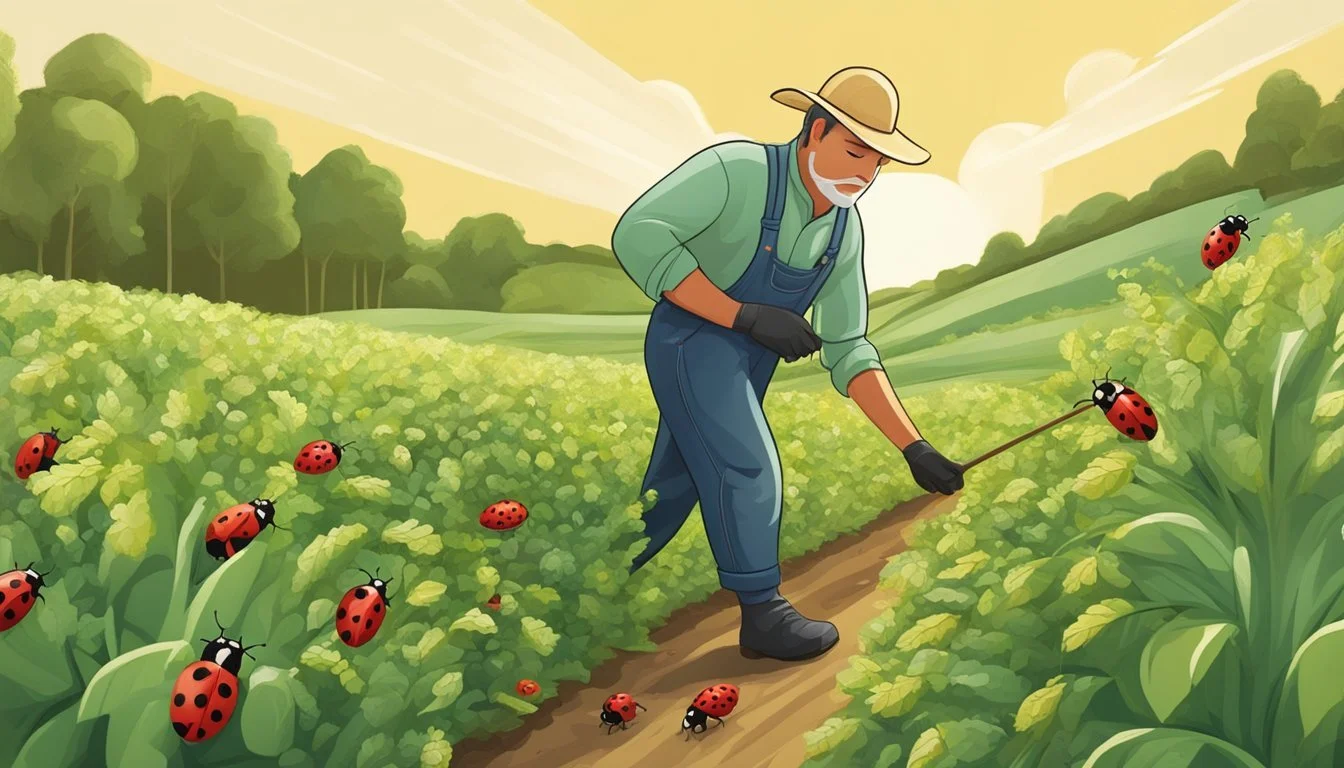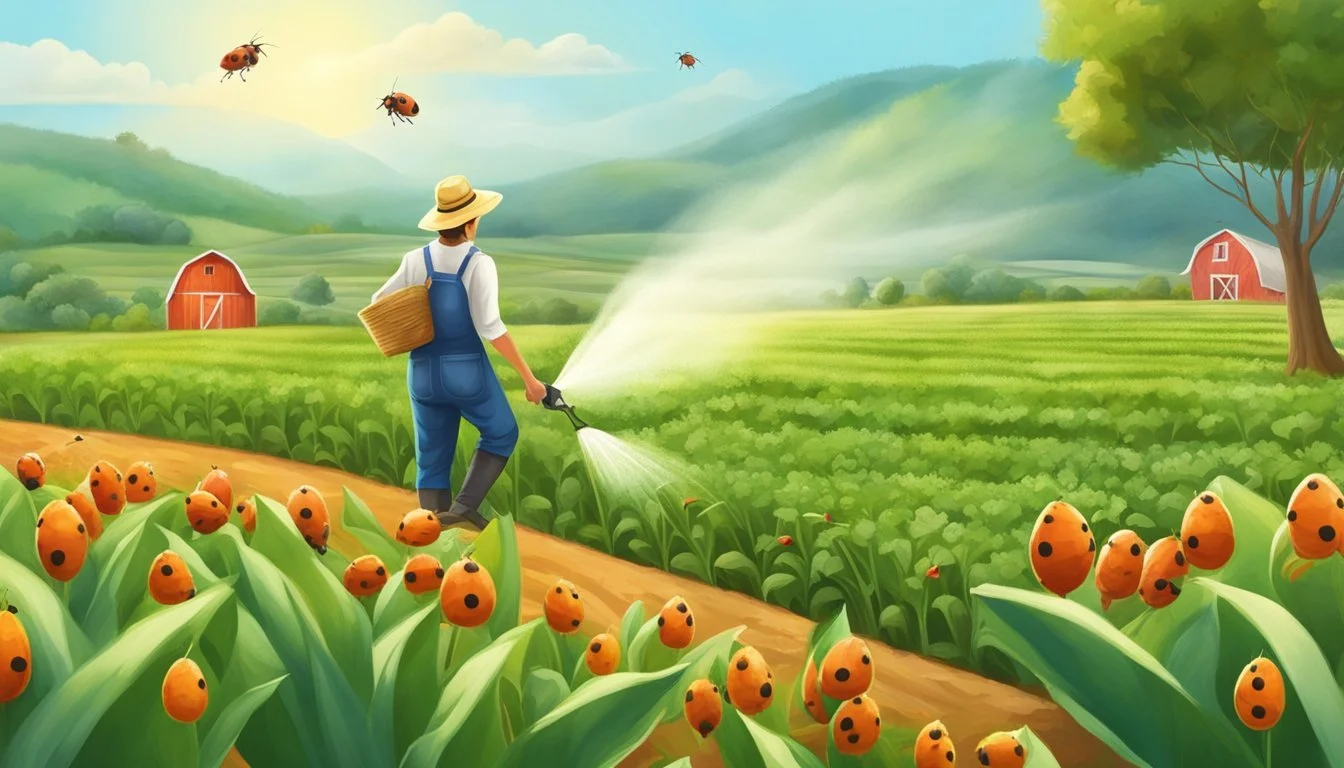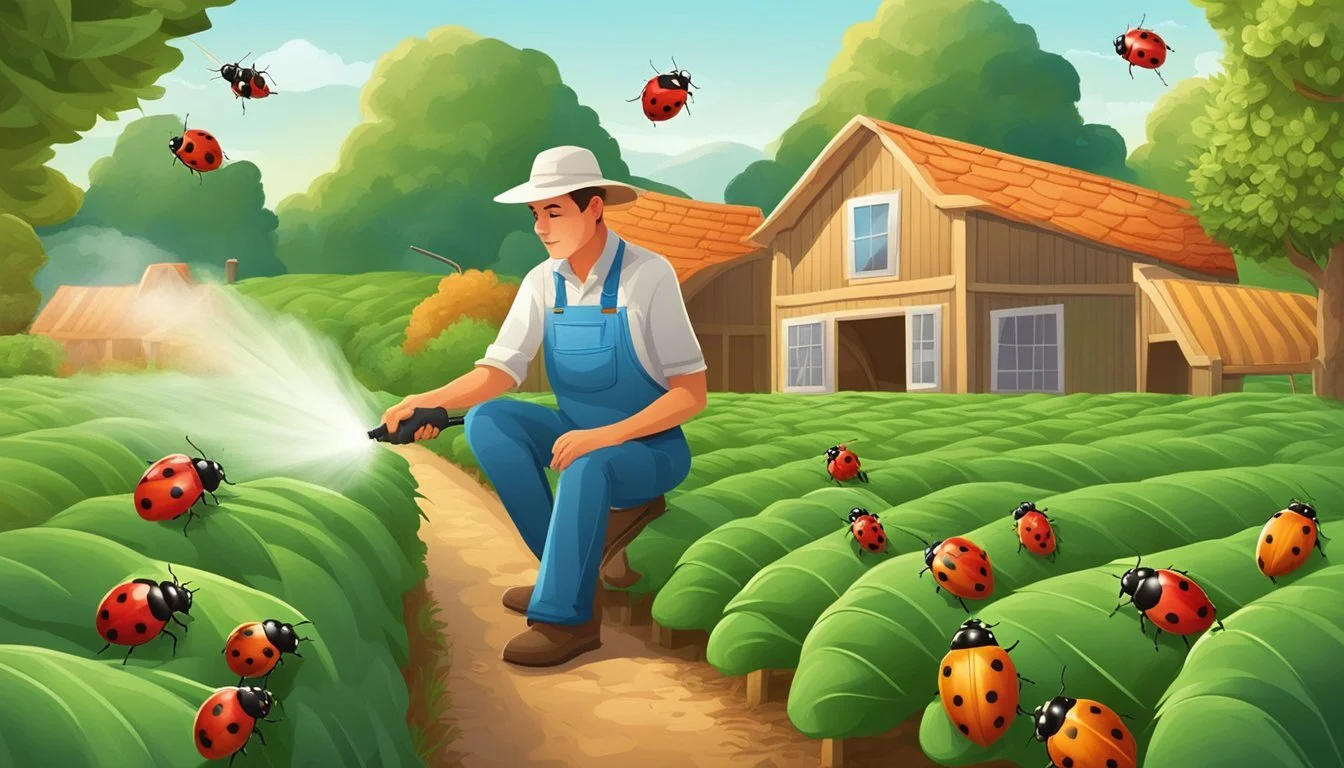Pest Control in Organic Farming
Sustainable Strategies for Healthy Crops
Pest control is a critical aspect of agriculture, particularly in organic farming where the use of synthetic chemicals is restricted. Organic farmers prioritize sustainable and eco-friendly methods to manage pests, which can include insects, weeds, and diseases. These methods focus on maintaining ecological balance and soil health, employing strategies that are less invasive and harmonious with nature. Biological, cultural, and physical tactics are combined to form a robust defense against potential threats to crop health and productivity. Organic pest control practices strive to be safe for the environment, farm workers, and consumers, aiming to ensure the integrity and quality of the organic label.
In organic farming, pest management begins with prevention through a healthy and diverse agroecosystem. Crop rotation, intercropping, and the use of resistant varieties contribute to reducing the occurrence and impact of pests. When intervention is necessary, organic farmers often turn to natural predators and beneficial insects to mitigate pest populations. Companion planting and the creation of habitats for pest predators also play significant roles in maintaining pest control without chemical inputs. These methods, rooted in a deep understanding of ecological interactions, demonstrate how organic farming aligns agricultural practices with natural processes.
Understanding Organic Farming
Organic farming is a comprehensive production management system that promotes and enhances ecosystem health, including biodiversity, biological cycles, and soil biological activity. This is achieved by avoiding the use of synthetic inputs, such as synthetic pesticides and fertilizers, with the intent to maintain ecological balance and conserve biodiversity.
Principles of Organic Agriculture
Organic agriculture is grounded in four main principles:
Health: Organic farming should sustain and enhance the health of soil, plant, animal, human, and planet as one and indivisible.
Ecology: Agriculture must be based on living ecological systems and cycles, work with them, emulate them, and help sustain them.
Fairness: Fairness is characterized by equity, respect, justice, and stewardship of the shared world, both among people and in their relationships to other living beings.
Care: Organic agriculture should be managed in a precautionary and responsible manner to protect the health and well-being of current and future generations and the environment.
These principles help to create a farming system that strives for environmental sustainability, enhances soil quality and biodiversity, and contributes to food security.
Organic Farming vs Conventional Agriculture
Use of Synthetic Inputs:
Organic Farming: Prohibits synthetic chemicals and relies on natural processes and biodiversity to manage pests and nurture the soil.
Conventional Agriculture: Frequently uses synthetic pesticides and fertilizers to maximize crop yields.
Impact on Ecosystems:
Organic Farming: Focuses on maintaining ecological balance and enhancing soil quality and diversity within the farm ecosystem.
Conventional Agriculture: May disrupt ecological balances, reducing biodiversity and potentially harming the environment with chemical runoff.
Sustainability and Food Security:
Organic Farming: Aims to achieve environmental sustainability and food security through eco-friendly practices.
Conventional Agriculture: Prioritizes short-term yield sometimes at the expense of long-term environmental sustainability.
Farmer Types and Practices:
Organic Farming: Usually involves smaller-scale farmers but can include any farmer types dedicated to organic principles.
Conventional Agriculture: Can vary from small family farms to large industrial farming operations with an emphasis on yield.
Organic farming acknowledges the diversity of farming practices across the globe and encourages context-specific solutions that respect local ecosystems and social-economic conditions.
Pest Management in Organic Systems
Organic farming integrates a multitude of pest management strategies focusing on ecological balance and preventive actions to mitigate pest-related issues.
Ecological Principles of Pest Control
Ecological principles form the bedrock of pest control in organic farming. This approach prioritizes the establishment of a balanced ecosystem where beneficial organisms and natural enemies of pests, such as predators and parasitoids, play a critical role. Organic agriculture leverages landscape complexity to enhance ecosystem services, which includes promoting biodiversity. These services naturally suppress pest populations and reduce the incidence of outbreaks. Preventive actions are emphasized over reactive ones, employing a thorough risk assessment to understand and manage ecological dynamics for effective disease management.
Pest Control Strategies in Organic Farming
Pest control strategies within organic systems vary, employing both preventive methods and direct intervention methods:
Biological Pest Control: The use of living organisms that are natural enemies of pests.
Cultural Tactics: Crop rotation, intercropping, and habitat augmentation to disrupt pest life cycles.
Physical or Mechanical Controls: Barriers, traps, and manual removal.
Botanical or Biological Pesticides: Derived from natural materials and used as a last resort under strict regulation.
Farmers engage in a decision-making process that analyzes each strategy’s efficacy and compatibility with organic standards. The emphasis is on creating a robust system where crop protection strategies and natural processes work in concert to form an effective and sustainable approach to pest management. Options range from fostering natural pest control mechanisms to employing specific interventions when thresholds are met. The overriding goal is to maintain the integrity of the organic system and reduce reliance on any form of pesticide use.
Key Challenges and Sustainable Approaches
In organic farming, managing pest threats while promoting soil health and biodiversity are crucial for crop productivity and environmental sustainability.
Dealing with Pest Threats
Organic farmers face the challenge of pest suppression without the use of synthetic pesticides that can lead to adverse effects on human health and the environment. They must instead rely on strategies that can effectively manage pest pressure while causing minimal damage to the ecosystem. Ecological intensification is one such method, which involves increasing plant diversity and encouraging predator diversity. This, in turn, can naturally reduce pest infestations. Additionally, the use of multiline cultivars can reduce the likelihood of widespread pest problems, as diverse genetic material in crops can prevent the dominance of a single pest.
Promoting Soil Health and Biodiversity
Soil health is fundamental to the success of organic farming. Maintaining high soil fertility and preventing soil fertility decline are essential to combat the yield gap between conventional and organic systems. Practices such as crop rotation and cover cropping can boost top soil carbon stocks, enhancing microbial life and overall soil structure. This also aids in pest suppression by fostering environments conducive to natural pest predators. Embracing weighted decision-making processes can help farmers evaluate the benefits and risks of various practices, minimizing potential economic losses. A focus on biodiversity, both above and below ground, ensures a more resilient farming system that can withstand and recover from pest threats and pest pressure.
Implementing Effective Pest Control
In organic farming, effective pest control is achieved through a nuanced understanding of ecological relationships and the use of diverse methods. Organic farmers focus on the management of insects, diseases, and weeds in ways that maintain agricultural productivity while also conserving arthropod diversity and promoting beneficial biological processes such as pollination.
Cultural and Biological Controls
Cultural controls involve altering the farming ecosystem to reduce the prevalence of unwanted pests. Crop rotation and the cultivation of polycultures are two key strategies that enhance the resilience of the crop yield. By rotating crops, farmers disrupt the lifecycle of pests and reduce the accumulation of diseases that often occurs with single-crop systems, or monocultures. Implementing polycultures — growing multiple crop species in the same space — encourages beneficial insects and arthropod diversity, which can naturally control pest populations.
Biological control, another cornerstone of organic farming, leverages the natural enemies of pests to manage insect populations and plant diseases. This includes the introduction or conservation of predators, parasitoids, and pathogens that target specific pests. Practices like using pheromones to disrupt pest mating patterns without affecting other insects have been proven effective.
It is also important for farmers to build their knowledge base on biological interactions within their specific context to adapt these strategies successfully, thereby avoiding the need for agricultural intensification and reducing the risk factors for zoonosis emergence.
Mechanical and Physical Controls
Mechanical and physical controls play a significant role in direct pest management. They work by creating barriers or removing pests manually from the environment. This includes methods such as:
Handpicking of larger bugs and insects.
The use of tillage to disrupt the life cycle of weeds and soil-bound pests.
Employing traps and barriers, such as nets or row covers, to physically block or capture pests.
These tactics can be labor-intensive but are essential components in an integrated pest management approach, which is a key part of preventing disease management issues while conserving beneficial insect populations.
Moreover, mechanical control tools are crucial for reducing the weed populations that compete with crops for resources, without causing harm to the soil structure or non-target organisms. Sustainability in organic farming not only relies on the increase of positive factors such as pollination and biological control but also on the conscientious reduction of negative influences through mechanical and physical methods.
Impact on Crop Quality and Yield
Organic farming methods strive to harmonize pest control with environmental preservation, which has direct implications for crop yield and quality.
Influence of Pest Control on Crop Yield
Organic farming leverages natural biological processes for disease management, aiming to enhance soil fertility and minimize economic losses without synthetic pesticides. Studies indicate that organic practices can lead to competitive crop yields, particularly when viewed in the context of long-term soil health. An example is research published in Nature, which showed that organic management can positively impact pest infestation levels, influencing the number of marketable crops. Moreover, crop rotation—a cornerstone of organic agriculture—provides habitat for natural enemies of pests, thereby supporting food security by maintaining steady production levels.
Effects on Product Quality and Consumer Health
The shift in global diets towards organic produce is rooted in concerns over health effects stemming from conventional pesticide use. Organic farming minimizes exposure to these chemicals, which is anticipated to contribute to safer, higher-quality food with reduced contamination risks. According to studies cited in ScienceDirect, organic approaches are reported to improve the nutritional quality of crops, a critical component of consumer health. Furthermore, the proactive nature of organic farming directly confronts the challenge of food security by promoting ecological balances that support ongoing, sustainable production.
Advancements in Organic Pest Control
Emerging organic pest control strategies are increasingly focused on ecological balance and environmental sustainability. These methods leverage the natural abundance of biodiversity, deploying techniques that emphasize the strengths of organic systems.
Innovation in Organic Pest Management
Recent innovations in organic pest management involve the strategic use of natural enemies to maintain the ecological equilibrium and control pest populations. Researchers have documented increased effectiveness in the employment of biological pest control agents, such as predatory insects or mites, which thrive alongside crop growth without harming the environment. For instance, the introduction of certain predatory beetles and lacewings can directly reduce pest infestations without the need for harmful pesticides.
Additionally, there has been progress in the identification and application of naturally occurring plant compounds that have repellent or insecticidal properties. These substances contribute to a more diverse pest control toolkit that supports agricultural intensification without compromising ecological integrity. The approach aligns with ecological intensification, which aims to increase productivity by enhancing biodiversity and ecosystem services rather than relying solely on technical interventions.
Developing New Farming Practices
In the realm of developing new farming practices, scientists and farmers collaborate to create systems that foster plant diversity and reinforce the role of biological control. Augmented plant diversity not only contributes to global diets but also serves as a habitat for a variety of species, thereby increasing the overall abundance and efficacy of biological control agents within the farm ecosystem.
Farmers have been integrating technical skills with traditional knowledge to better understand the dynamics between crops, pests, and their natural enemies. This approach involves carefully designing crop rotations, intercropping systems, and polycultures to enhance on-farm biodiversity. Such practices not only disrupt pest infestations but also build ecological balance that benefits the entire food production system.
Through these updated practices, different farmer types—from smallholders to commercial producers—are able to embrace environmental sustainability. As a result, these innovative strategies not only help control pests effectively but also contribute to a healthier planet and more resilient agricultural systems.
Conclusion
Organic farming is recognized as an environmentally friendly approach to agriculture. It relies on ecological balance and proactive methods for pest control, rather than synthetic chemicals. Researchers have found that organic methods can effectively promote pest management, although the level of success can vary.
One key to effective pest control in organic farming is understanding the economic thresholds for pests and diseases. Farmers must determine the population levels at which pest control measures are economically justified.
Organic farming underscores the importance of preventive measures. By focusing on preventing pest problems, farmers can often mitigate issues before they require more drastic intervention. Life sciences and agriculture professionals are encouraged to have backgrounds in decision theory and risk evaluation to support their pest-control decisions.
The promotion of biodiversity and the use of biological pest control methods are central to organic farming. These strategies contribute to maintaining soil quality and ecosystem health. Ultimately, the practice of organic farming can enhance biodiversity and sustain agricultural productivity, while also ensuring food security and safety.
Outlined strategies and findings can be explored further through studies such as those presented in ScienceDirect and Nature. They elaborate on the effectiveness of organic farming practices in maintaining pest control without relying on synthetic agrochemicals.
Frequently Asked Questions
Organic farmers employ a range of strategies to manage pests without synthetic chemicals. Understanding these methods is crucial for appreciating the holistic approach of organic agriculture.
How do organic farmers control pest populations without synthetic chemicals?
Organic farmers typically use methods like crop rotation, biological pest control, and the cultivation of pest-resistant varieties to manage pest populations without resorting to synthetic chemicals.
What natural pest management techniques are utilized in organic agriculture?
In organic agriculture, natural pest management techniques include the introduction of natural predators, the use of beneficial insects, application of organic pesticides, and mechanical methods such as handpicking or traps.
In what ways do organic pesticides differ from conventional pesticides?
Organic pesticides are derived from natural sources and are generally biodegradable, causing less harm to the environment and non-target organisms compared to conventional pesticides, which are often synthetic and can persist in the environment.
How are pest management strategies integrated into organic farming practices?
Pest management strategies in organic farming are integrated through comprehensive practices like soil health enhancement, crop diversity, and habitat manipulation to encourage beneficial insects, creating a balanced ecosystem that naturally reduces pest outbreaks.
What are the challenges faced in organic pest control, and how are they addressed?
Challenges in organic pest control include variable efficacy and limited availability of organic pesticides. These are addressed through continued research, education on best practices, and sharing knowledge among the organic farming community.
Can organic pest control methods be as effective as synthetic pesticides for large-scale farming?
For large-scale farming, organic pest control methods can be as effective as synthetic pesticides when properly implemented as part of a well-designed farm management plan that emphasizes prevention and uses controls as part of a multi-tactic approach to pest management.







